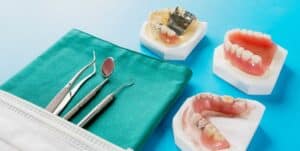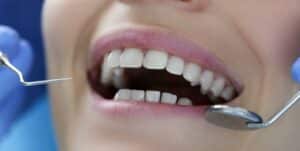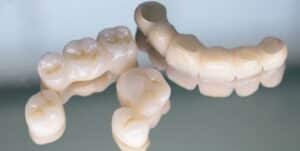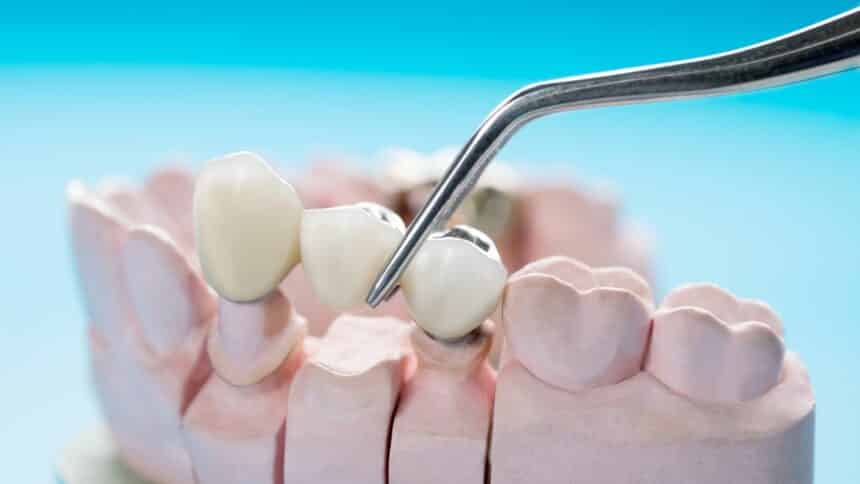Missing teeth are not only an aesthetic problem, but above all a health problem. They can cause tooth displacement, tooth sensitivity, headaches, problems with speaking, and inadequate grinding of food. Therefore, if for various reasons you do not have all your teeth, get your missing teeth replaced as soon as possible. Depending on your needs, you can benefit from various prosthetic solutions from crowns, bridges, implants and dentures. Today we will focus on denture bridges in the UK, what exactly they are, who they are for and how much they cost.
However, let's start with some basic information.
Negative effects of missing teeth
Missing several or even one tooth is primarily an aesthetic problem for many people. However, the health consequences are much more important.
The first is the risk of displacement of the remaining teeth, which can lead to malocclusion. But that is not all! Significant tooth displacement can prevent subsequent restoration of missing or even loss of teeth.
Missing teeth also lead to overloading remaining teeth, causing abrasion and cracking, as well as sensitivity. They can also cause periodontal changes in neighbouring teeth and loosening.
On top of this, headaches and changes in the temporomandibular joint, as well as impaired chewing function. Poorly fragmented foods are the cause of disorders in digestion and the functioning of the entire digestive system.
Importantly, missing teeth are not just a problem when smiling or speaking. They also change the appearance of the face by shortening its lower part and drooping corners of the mouth.
Therefore, it is better to take care of the missing teeth and not expose yourself to any of the above consequences.

Crows, bridges, implants or maybe a denture - what to choose?
The answer is simple - whatever will be most beneficial for you in terms of health, but also financially.
Therefore, if you are struggling with missing teeth it is best to call us as soon as possible and make an appointment. Depending on whether you are missing one tooth, several or most, your dentist will select a specific prosthetic solution.
They can be crowns, a type of cap that imitates a single tooth. They are most commonly used if you have a chipped or damaged tooth and another filling no longer makes sense. If you would like to learn more about this solution, we recommend our article "Crowns for teeth in the UK - everything you need to know„.
If one or more teeth are missing, implants or dentures can also be used. The first solution is very durable and comfortable, but also expensive. Find out exactly how much implants cost in the UK and what exactly they are in our resource „Implants UK - everything you need to know". Dentures are a cheaper solution - but if you are interested in this topic we recommend our other article "Dentures in the UK - types and prices".
The last of the prosthetic solutions for missing teeth are bridges.

Prosthetic bridges in the UK - which is basically what?
Bridges are used for partial missing teeth. They are an alternative to removable partial dentures and, because they are permanently fixed, offer the patient much greater comfort.
Prosthetic bridges consist of pillars and a span. Pillars are a minimum of two dental crowns that are attached to the patient's own ground teeth. They provide support for the span, which forms the dental crowns that fill the missing teeth.
In colour, they are matched to the patient's natural dentition, so prosthetic bridges are almost invisible.

For whom are dental bridges in the UK a good option?
You can only have prosthetic bridges fitted if the tooth gap is surrounded by other teeth. These form the support for the entire structure. Therefore, if you do not have, for example, a fifth, a sixth and a seventh, and you would like to replace the missing teeth, you cannot use this solution. You are left with implants or removable dentures.
As the placement of a prosthetic bridge requires grinding of the patient's healthy teeth, they are used for larger interdental shoulders. If a single tooth is missing, the aforementioned implants are much more commonly used.
Types of prosthetic bridges
Depending on the material used, bridges can be divided into several types:
- Acrylics - are used as a temporary restoration, although they are reasonably aesthetically pleasing, they are impermanent.
- Porcelain on a metal substructure - a very good solution from a financial point of view, with good durability and a very good aesthetic effect.
- All-ceramic - the most permanent solution, giving the best aesthetic result.
Visit to a prosthodontist
The first visit always starts with a consultation and a check of the condition of the entire mouth. It may be that the dentist recommends dental treatment before fitting a prosthetic bridge.
The next step is to prepare the teeth for the restoration and to take an impression from which a model of the bridge will be created.
In our practice we have dispensed with the unpleasant procedure of which was the taking of impressions (biting into a special mass for several minutes, the taste of which, as well as the amount, often caused a vomiting reflex). Instead, our patients have at their disposal intraoral scanner. The state-of-the-art device provides a three-dimensional image of the dentition in a few minutes, and the scan itself is painless for the patient.
This is sent to the laboratory where our prosthetic bridges in the UK are prepared. During this time, the patient receives a temporary restoration to protect the ground teeth. On the other hand, it is a time when the patient can get used to the restoration or make any comments.
The final step is to cement the actual bridge in place permanently.

Denture bridges in the UK - price
We offer three types of dental bridges in the UK at our practice: a fibreglass-based bridge, a porcelain bridge on a metal substructure and a zirconium oxide/all-ceramic bridge. Their prices start from £210 per point.
Exact prices, not only for these restorations, but also for temporary bridges or cementing or removing bridges not made in our office, can be found in the our price list.
Importantly, if you decide to have a prosthetic bridge fitted, you do not have to pay the whole amount at once. At our practice, you can spread payment for the entire treatment - visits, scan and bridge - into instalments that are convenient for you. The first 12 months are zero interest, meaning you only pay back the amount you have spent.
If you want to find out more call us or read our article Teeth on credit: dental treatment on hire purchase".
IMPORTANT: Our installment system is 100% secure and regulated by the Financial Conduct Authority (FCA number 619628).


